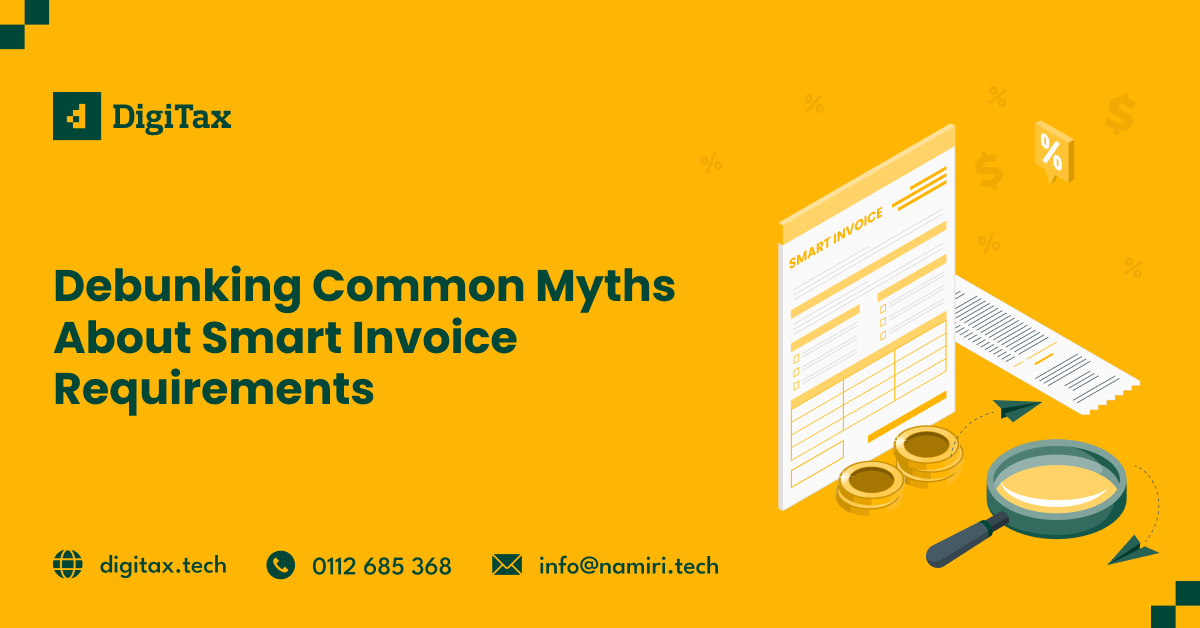DEBUNKING SOME SMART INVOICE REQUIREMENT MYTHS.
During the 2024 National Budget address by the Minister of Finance and National Planning, several tax changes and measures were announced to improve revenue collection, and enforcement, and encourage taxpayer compliance. Among these is the introduction and implementation of Electronic Invoicing, which requires taxpayers to use the Smart Invoice system to record all sales transactions.
Electronic Invoicing, commonly known as e-invoicing, refers to the process of generating, sending, receiving, and processing invoices electronically. The Smart Invoice is a software-based solution that helps taxpayers manage invoices and stock data transmitted directly to the ZRA.
While designed to enhance revenue collection, compliance, and enforcement, this new measure has raised concerns and fears among taxpayers.
Below are 10 common myths that have caused discomfort, despite the clear advantages that Smart Invoice offers.
Myth 1: Increased Costs of Compliance
Fact: The Smart Invoice system actually reduces costs. By minimizing the need for paper and printing, it eliminates physical storage expenses. Additionally, the system helps reduce data entry errors, lowering the risk of penalties and interest due to inaccurate declarations. This leads to overall savings in compliance management.
Myth 2: Limited Usability
Fact: The Smart Invoice system offers a versatile range of invoicing solutions tailored to meet the diverse needs of different taxpayers. DigiTax supports all these solutions, ensuring seamless compliance for all taxpayers i.e. A simple, on-the-go invoicing solution, A web-based dashboard solution allowing easy access from any browser and for businesses with more advanced invoicing systems, DigiTax offers seamless integration, ensuring compliance with ZRA's Smart Invoice standards.
DigiTax ensures that businesses of all sizes and industries have access to a solution that fits their specific needs, simplifying compliance while enhancing operational efficiency.
Myth 3: Difficulty in Accessibility
Fact: Accessing the Smart Invoice system is straightforward with DigiTax. Taxpayers can easily visit zm.digitax.tech from any web browser to get started. Simply sign up, and you'll be guided through the process of selecting and implementing the invoicing solution that best fits your needs. DigiTax ensures a user-friendly experience, making compliance more accessible than ever.
Myth 5: Monetary Threshold Required to Register for Smart Invoice
Fact: There is no monetary threshold for registering for the Smart Invoice system. Eligibility is based on tax registration rather than financial thresholds. Businesses need to be registered for any of the following taxes to use Smart Invoice: Value Added Tax (VAT), Turnover Tax (TOT), Insurance Premium Levy (IPL), Tourism Levy (TL), Excise (coal and electricity), Rental Tax, or Income Tax.
Myth 6: No Information for Integration
Fact: Comprehensive integration documentation is readily available on DigiTax’s website zm.digitax.tech. Additionally, DigiTax offers robust support and clear integration guidelines to ensure a smooth transition. Our team provides detailed resources and assistance to help businesses seamlessly integrate with Smart Invoice, aligning with our commitment to simplifying compliance and enhancing operational efficiency.
Myth 7: Limited Integration
Fact: Contrary to the belief of limited integration, Smart Invoice can be seamlessly integrated with a wide range of cloud-based software. DigiTax enhances this capability by offering integration with all relevant ERPs, ensuring that businesses can connect their existing systems effortlessly. Our comprehensive integration solutions streamline compliance, allowing for a smoother and more efficient invoicing process.
Myth 8: No Security for Taxpayers’ Systems and Data
Fact: Security is a top priority in e-invoicing, and robust measures are in place to protect sensitive financial data. Smart Invoice employs advanced encryption, secure transmission methods, authentication protocols, and stringent data access controls to safeguard taxpayer information.
DigiTax further reinforces these security standards by implementing additional safeguards to ensure the highest level of protection for your systems and data, providing peace of mind and reliability.
Myth 9: Elimination of Zero-Rating for Local Purchase Orders (LPOs)
Fact: Local Purchase Orders (LPOs) will continue to be utilized under the Smart Invoice system. Clients must still provide LPOs to their taxable suppliers to enable the issuance of zero-rated invoices for goods or services. This process remains unchanged, ensuring that businesses can maintain their zero-rating practices as required.
Myth 10: No Amendments Allowed After a Smart Invoice Sale is Completed
Fact: Amendments to transactions after a Smart Invoice sale are indeed possible. Businesses can use credit notes to make post-sale adjustments, ensuring accuracy and flexibility in managing their invoicing and accounting processes.
DigiTax facilitates this process by allowing users to easily issue and manage credit notes for any necessary amendments. This ensures that businesses can correct and adjust their invoices as needed, maintaining accuracy and compliance with ease.
Conclusion
Addressing these common myths about the Smart Invoicing system and compliance process is essential for understanding its requirements, benefits and capabilities. DigiTax is dedicated to supporting businesses through every step of the transition to Smart Invoice, ensuring seamless integration and compliance with ZRA regulations.
Our team is ready to assist you in navigating the Smart Invoicing compliance process and addressing any questions or concerns you may have. To get started, simply sign up for free at zm.digitax.tech and take the first step toward streamlined invoicing and enhanced compliance. For further assistance or more information, feel free to contact us. We're here to help you succeed. Contact us to learn more: call +260770295201 or email us at zambia@namiri.tech
Article contributed by: FLOYD Kaingu


